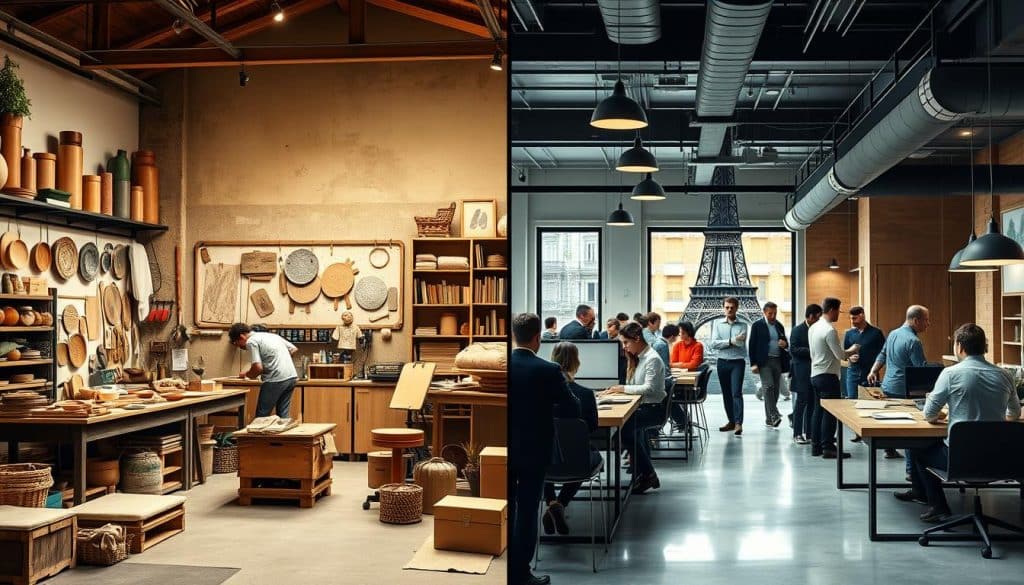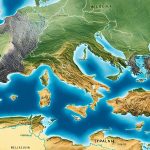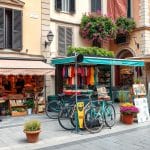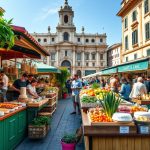Free Business Opportunity Checklist
Download our comprehensive Italy vs France Business Opportunity Checklist to evaluate which country is better suited for your specific business idea.
Economic Overview: Italy vs France
Before diving into specific business ideas, it’s essential to understand the economic foundations of both countries. Italy stands as the third-largest economy in the Eurozone and eighth globally, while France holds the position of second-largest economy in Europe and seventh worldwide.
Italian Economy
Italy’s economy is characterized by a strong manufacturing base, particularly in high-quality goods and luxury products. The country has over 3.7 million small and medium-sized enterprises (SMEs), which generate approximately 75% of jobs and contribute significantly to the GDP. Recent economic initiatives like the Transition Plan 4.0 have allocated €13.381 billion for technology and innovation, offering tax credits for businesses investing in new technologies.
Despite facing challenges like bureaucratic complexity and regional economic disparities, Italy’s GDP has shown resilience, with growth projections of around 1% for 2024. The country has also seen employment increases, with over 260,000 new jobs created recently.
French Economy
France boasts a diverse economy with strengths in manufacturing, tourism, agriculture, and services. The country is particularly known for its robust innovation ecosystem, supported by government initiatives like La French Tech, which has helped establish France as a leading European startup hub. France’s GDP per capita is approximately 15% higher than Italy’s, reflecting its stronger overall economic position.
The French government offers numerous incentives for entrepreneurs, including the Innovating in SMEs program and the Young Innovative Company initiative. These programs provide funding and support for businesses developing new products, processes, and services, making France an attractive destination for innovative startups.
| Economic Indicator | Italy | France |
| GDP Ranking (Europe) | 3rd | 2nd |
| SME Contribution to Employment | 75% | 61% |
| GDP Growth (2024 Projection) | 1.0% | 1.2% |
| Innovation Ranking (EU) | 19th | 11th |
| Ease of Doing Business Rank | 58th | 32nd |
Cultural and Business Environment Differences
Italian Business Culture
Italian business culture places high value on personal relationships and face-to-face interactions. Business decisions often involve multiple stakeholders and may take longer as relationships are established. Family-owned businesses remain prevalent throughout the country, with many successful enterprises passing through generations.
Networking is particularly important in Italy, where introductions through trusted connections can open doors that might otherwise remain closed. The concept of “bella figura” (making a good impression) extends to business interactions, with appearance, communication style, and social etiquette carrying significant weight.
Regional differences are pronounced in Italy, with the industrialized north contrasting with the more agricultural south. These regional variations influence business practices, consumer preferences, and market opportunities.
French Business Culture
French business culture tends to be more formal and hierarchical than Italian business culture. Respect for authority and proper protocols is important, and business relationships typically develop more slowly and methodically. The French approach to business often emphasizes intellectual discussion and theoretical frameworks before practical implementation.
Communication in French business settings can be direct, with debate and critical analysis valued as part of the decision-making process. While personal relationships matter, professional credentials and expertise carry significant weight in establishing credibility.
France has a strong tradition of government involvement in business, with public-private partnerships common across various sectors. This creates both opportunities and challenges for entrepreneurs navigating the French market.
Italian Business Environment Advantages
- Strong tradition of craftsmanship and quality production
- Flexible approach to business relationships
- Growing support for innovative startups
- Strategic location for Mediterranean and European markets
- Strong brand recognition for “Made in Italy” products
Italian Business Environment Challenges
- Complex bureaucracy and administrative procedures
- Slower pace of business decisions
- Regional economic disparities
- Higher corporate taxation compared to some EU countries
- Less developed venture capital ecosystem
French Business Environment Advantages
- Strong innovation ecosystem and tech infrastructure
- Robust government support for startups and SMEs
- Excellent transportation and logistics networks
- Access to EU’s largest consumer market
- Highly skilled workforce with technical expertise
French Business Environment Challenges
- Rigid labor laws and regulations
- High social security contributions for employers
- Formal hierarchical business structures
- Language barriers for non-French speakers
- Competitive market with established players
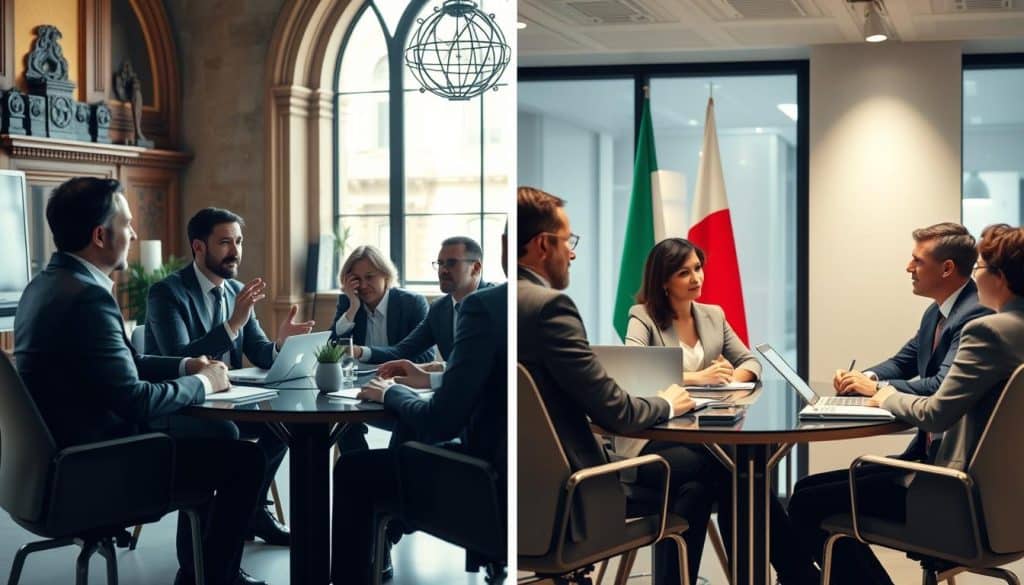
Trending Business Sectors in Italy
Italy offers diverse opportunities across traditional and emerging sectors. The country’s rich cultural heritage, manufacturing expertise, and growing focus on innovation create a unique business landscape with several promising areas for entrepreneurs.
Artisanal Food and Beverage
Italy’s reputation for culinary excellence creates abundant opportunities in the food and beverage sector. Artisanal products, organic foods, and specialty items with regional designations (DOP, IGP) command premium prices both domestically and internationally. The growing demand for authentic Italian food experiences has created opportunities for:
- Specialty food production and export businesses
- Food tech startups focusing on sustainability and traceability
- Gourmet food tours and culinary experiences
- Artisanal coffee cafes and specialty beverage businesses
- Online marketplaces for authentic Italian products
With Italian food exports reaching record levels, businesses that combine traditional quality with modern marketing and distribution strategies are particularly well-positioned for success.
Sustainable Fashion and Design
Italy’s fashion industry is evolving to embrace sustainability while maintaining its reputation for quality and craftsmanship. Opportunities in this sector include:
- Eco-friendly clothing and accessory brands
- Upcycled fashion and circular economy initiatives
- Sustainable textile development and production
- Ethical luxury goods manufacturing
- Fashion tech platforms connecting artisans with global markets
The “Made in Italy” label continues to carry significant value in global markets, particularly when combined with sustainable practices and transparent supply chains.
Tourism Innovation
Italy’s tourism sector is ripe for innovation, with opportunities to create unique experiences beyond traditional mass tourism. Promising areas include:
- Specialized tour services focusing on niche interests (art, architecture, wine)
- Agritourism and rural experience businesses
- Digital platforms connecting travelers with authentic local experiences
- Luxury villa and boutique accommodation management
- Virtual tourism experiences and digital heritage preservation
With tourism representing approximately 13% of Italy’s GDP, businesses that offer authentic, sustainable, and personalized experiences can capture value in this competitive market.
Explore Italian Business Opportunities
Discover which Italian business sector aligns with your entrepreneurial vision. Our experts can help you navigate the Italian market.
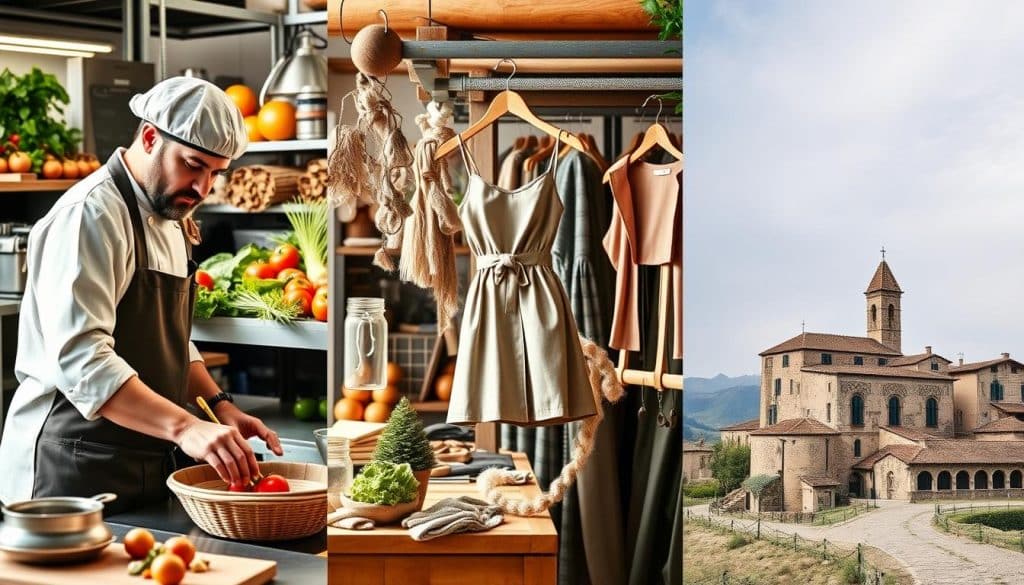
Regional Business Opportunities in Italy
Italy’s diverse regions offer distinct business environments and opportunities. Understanding these regional differences is crucial for entrepreneurs targeting specific markets within the country.
Northern Italy (Milan, Turin, Venice)
Northern Italy represents the country’s economic powerhouse, with Milan serving as the financial and fashion capital. This region offers:
- Strong manufacturing and industrial base
- Fashion and design industry opportunities
- Advanced technology and innovation hubs
- Proximity to European markets
- Well-developed infrastructure and logistics
The north is ideal for businesses in fashion, finance, manufacturing, and technology sectors, with higher purchasing power but also higher operational costs.
Central Italy (Rome, Florence, Tuscany)
Central Italy combines cultural heritage with diverse economic activities, centered around Rome and Florence. Opportunities include:
- Tourism and cultural experience businesses
- Food and wine production and experiences
- Artisanal crafts and traditional manufacturing
- Creative industries and design
- Government and international organization services
This region balances tradition with innovation, offering opportunities for businesses that leverage cultural heritage while embracing modern approaches.
Southern Italy (Naples, Sicily, Puglia)
Southern Italy offers emerging opportunities with lower costs and growing investment. Key advantages include:
- Lower operational and labor costs
- Agricultural production and food processing
- Growing tourism destinations
- Renewable energy development
- Special economic incentives for development
While facing infrastructure challenges, southern regions offer significant growth potential, particularly in agriculture, tourism, and renewable energy sectors.
Legal and Regulatory Considerations for Startups in Italy
Business Structure Options
Italy offers several business entity types, each with different liability protections, tax implications, and capital requirements:
- Società a Responsabilità Limitata (SRL) – Limited liability company with a minimum capital requirement of €10,000
- Società a Responsabilità Limitata Semplificata (SRLS) – Simplified limited liability company requiring only €1 in share capital
- Società per Azioni (SpA) – Joint stock company suitable for larger operations, requiring €50,000 minimum capital
- Ditta Individuale – Sole proprietorship with simplified requirements but no liability protection
Registration Process
The business registration process in Italy typically involves:
- Obtaining a tax identification number (Codice Fiscale) for all founders
- Drafting and notarizing company bylaws and articles of association
- Registering with the Business Register (Registro delle Imprese)
- Opening a corporate bank account
- Registering for VAT (Partita IVA)
- Enrolling with social security authorities
This process typically takes 4-6 weeks and costs between €2,000-€5,000 depending on the business structure and complexity.
Taxation
Italy’s tax system includes several key components for businesses:
- Corporate income tax (IRES) at 24%
- Regional production tax (IRAP) ranging from 3.9% to 4.82%
- Value-added tax (IVA) at a standard rate of 22%
- Special tax incentives for innovative startups and SMEs
- Flat-rate scheme for new businesses (15% for first five years)
Working with experienced accountants and tax advisors is highly recommended to navigate Italy’s complex tax system effectively.
Startup Italia Visa: Non-EU entrepreneurs can apply for the Italia Startup Visa, which requires a minimum investment of €50,000 and approval of an innovative business plan. This program offers a streamlined process for establishing innovative businesses in Italy.
Emerging Industries and Opportunities in France
Tech Startups and Digital Innovation
France has established itself as a leading European tech hub, with Paris emerging as a major startup capital. The government’s La French Tech initiative has created a supportive ecosystem for technology entrepreneurs. Key opportunities include:
- Software development and SaaS solutions
- Artificial intelligence and machine learning applications
- Fintech and financial services innovation
- E-commerce platforms and digital marketplaces
- Cybersecurity and data protection services
With over 10,000 startups and €5.4 billion in venture capital funding in 2020, France offers a robust environment for tech entrepreneurs, particularly those focusing on B2B solutions and enterprise software.
Sustainable and Eco-Friendly Businesses
France’s commitment to sustainability and environmental protection creates numerous opportunities for green businesses:
- Renewable energy development and services
- Eco-friendly product manufacturing and retail
- Circular economy initiatives and waste reduction
- Sustainable agriculture and food production
- Green construction and energy-efficient building solutions
The French government’s ecological transition initiatives provide financial incentives and support for businesses contributing to sustainability goals, making this a particularly attractive sector for environmentally conscious entrepreneurs.
Luxury and Premium Services
France’s global reputation for luxury and refinement extends beyond fashion to numerous sectors:
- High-end hospitality and experiential tourism
- Premium food and beverage production
- Luxury health and wellness services
- Bespoke personal services and concierge businesses
- Artisanal crafts with contemporary applications
Businesses that combine traditional French savoir-faire with modern innovation can capture value in the premium segment, both domestically and through export markets.
Explore French Business Opportunities
Discover which French business sector aligns with your entrepreneurial vision. Our experts can help you navigate the French market.
Government Support and Incentives for SMEs in France
Financial Incentives and Funding Programs
The French government provides various financial support mechanisms for businesses at different stages of development:
- Innovating in SMEs Program – Funding for companies developing new products, processes, and services
- Young Innovative Company (JEI) Status – Tax exemptions and reduced social charges for R&D-focused startups
- Bpifrance Loans and Guarantees – The public investment bank offers various financing solutions for SMEs
- Research Tax Credit (CIR) – Up to 30% tax credit on eligible R&D expenses
- Regional Economic Development Incentives – Additional support available in priority development zones
These programs can significantly reduce the financial burden for new businesses, particularly those focused on innovation and job creation.
Business Incubators and Accelerators
France boasts a robust network of incubators and accelerators that provide more than just funding:
- Station F – The world’s largest startup campus, located in Paris
- French Tech Incubators – Government-supported innovation hubs in major cities
- Industry-Specific Accelerators – Specialized programs for sectors like healthtech, fintech, and cleantech
- Corporate Innovation Programs – Partnerships between established companies and startups
- University-Affiliated Incubators – Research-based innovation support at major institutions
These organizations offer workspace, mentorship, networking opportunities, and often direct connections to investors and potential clients.
Administrative Simplification Initiatives
Recognizing that bureaucracy can be a barrier to entrepreneurship, France has implemented several initiatives to simplify business administration:
- Auto-entrepreneur Status – Simplified tax and social security regime for solo entrepreneurs
- Online Business Registration – Streamlined digital process for company formation
- One-Stop Shop Services – Centralized assistance for administrative procedures
- Simplified Accounting Requirements – Reduced reporting obligations for small businesses
- Digital Public Services – Online platforms for tax filing and regulatory compliance
French Tech Visa: This simplified, fast-track procedure helps tech companies based in France to bring in talent from abroad. The visa is available to founders, employees, and investors in the tech ecosystem, making it easier to build international teams.
Challenges for Entrepreneurs in France
Labor Laws and Employment Regulations
France’s labor code is among the most comprehensive and employee-protective in Europe, creating both benefits and challenges for employers:
- The standard workweek is limited to 35 hours, with strict overtime regulations
- Extensive employee protections make termination processes complex and potentially costly
- Mandatory benefits include 5 weeks of paid vacation, plus public holidays
- High employer social security contributions (approximately 42% of gross salary)
- Strong union presence and collective bargaining agreements in many sectors
These regulations provide stability and quality of life for employees but can increase operational costs and reduce flexibility for employers, particularly startups with fluctuating resource needs.
Administrative Complexity
Despite simplification efforts, France’s administrative environment remains challenging:
- Multiple regulatory bodies and compliance requirements
- Extensive documentation needs for various procedures
- Frequent regulatory changes requiring ongoing adaptation
- Language barriers in administrative processes for non-French speakers
- Regional variations in certain administrative procedures
Working with local experts, such as accountants and legal advisors familiar with French bureaucracy, is highly recommended to navigate these complexities effectively.
Market Competition and Consumer Behavior
The French market presents specific competitive challenges:
- Strong preference for established French brands in many sectors
- High quality expectations and consumer protection standards
- Price sensitivity combined with demand for premium quality
- Regional variations in consumer preferences and purchasing power
- Slower adoption of certain innovations compared to other markets
Success in the French market often requires thorough localization, quality-focused positioning, and patience in building brand recognition and trust.
Important Note: Foreign entrepreneurs should be aware that business negotiations and relationship building in France may take longer than in some other markets. The French business culture values thorough discussion and consideration before making decisions, which can extend timelines for partnerships and deals.
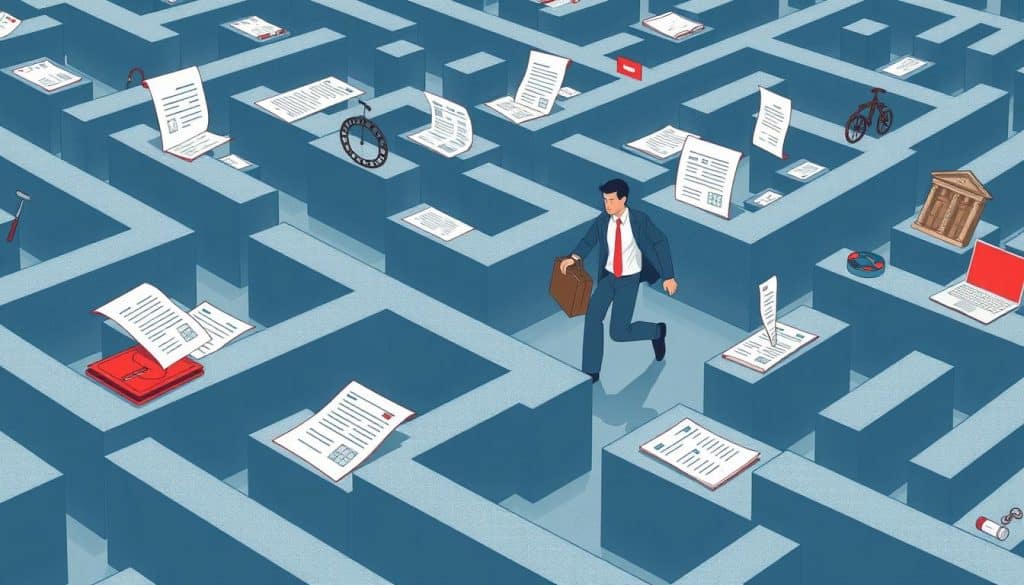
Business Comparison: Italy vs France
This direct comparison of key business factors helps entrepreneurs evaluate which country might better suit their specific venture.
| Business Factor | Italy | France |
| Company Formation Time | 4-6 weeks | 3-5 weeks |
| Minimum Capital Requirement (LLC) | €1 (SRLS) / €10,000 (SRL) | €1 (SAS, SARL) |
| Corporate Tax Rate | 24% + 3.9-4.82% regional tax | 25% |
| VAT Standard Rate | 22% | 20% |
| Employer Social Security Contribution | ~30% of gross salary | ~42% of gross salary |
| Standard Workweek | 40 hours | 35 hours |
| Paid Vacation Minimum | 4 weeks | 5 weeks |
| Startup Ecosystem Ranking (EU) | 11th | 2nd |
Revenue Potential and Startup Costs Comparison
Below is a comparison of three business types across both countries, examining revenue potential, startup costs, and market saturation.
| Business Type | Revenue Potential (Italy) | Startup Costs (Italy) | Market Saturation (Italy) | Revenue Potential (France) | Startup Costs (France) | Market Saturation (France) |
| Boutique Hotel | €150K-€500K/year | €300K-€1M | High in tourist centers, Low in emerging areas | €200K-€700K/year | €400K-€1.5M | Very high in Paris, Moderate in regions |
| Digital Marketing Agency | €80K-€300K/year | €10K-€50K | Moderate, growing demand | €100K-€500K/year | €15K-€70K | High, but strong demand |
| Artisanal Food Production | €50K-€250K/year | €30K-€150K | High domestically, Strong export potential | €60K-€300K/year | €40K-€200K | High domestically, Strong export potential |
Case Studies: Successful Business Models
Italian Success Story: Eataly
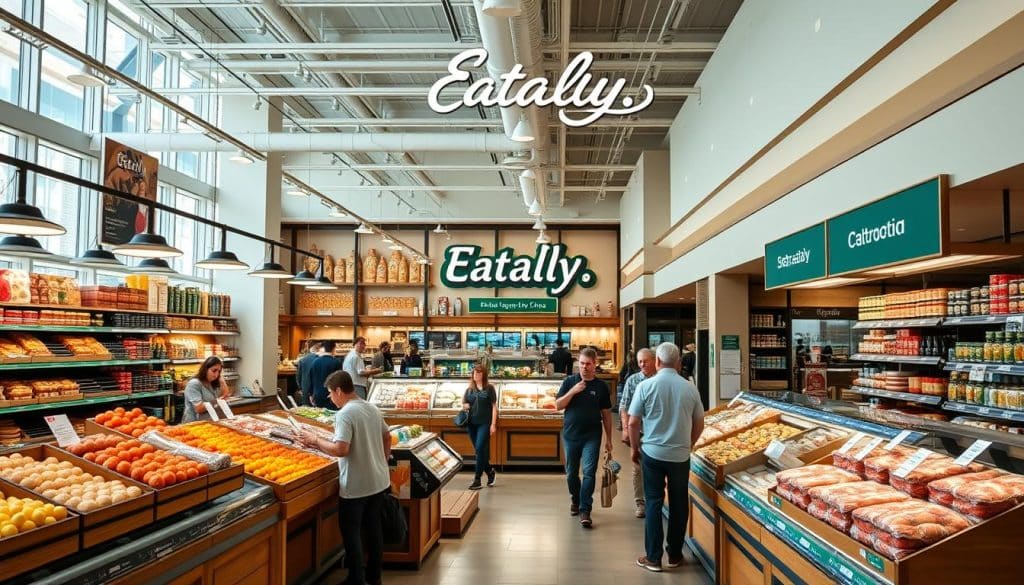
Business Model: Eataly revolutionized the concept of food retail by creating a hybrid marketplace-restaurant-education model focused on high-quality Italian food products.
Key Success Factors:
- Celebration of Italian regional food traditions and artisanal production
- Educational component that builds customer knowledge and appreciation
- Multi-format approach combining retail, dining, and learning
- Strategic locations in urban centers with high foot traffic
- Strong brand storytelling emphasizing quality and authenticity
Growth Strategy: After establishing its concept in Turin in 2007, Eataly expanded internationally through strategic partnerships, adapting its model to local markets while maintaining its core Italian identity. The company now operates over 40 locations worldwide, generating approximately €500 million in annual revenue.
Lessons for Entrepreneurs: Eataly demonstrates how traditional Italian strengths (food quality, regional specialties) can be packaged in an innovative format that creates immersive experiences for customers. This approach has allowed the company to command premium pricing while building a global brand based on Italian cultural heritage.
French Success Story: Le Slip Français
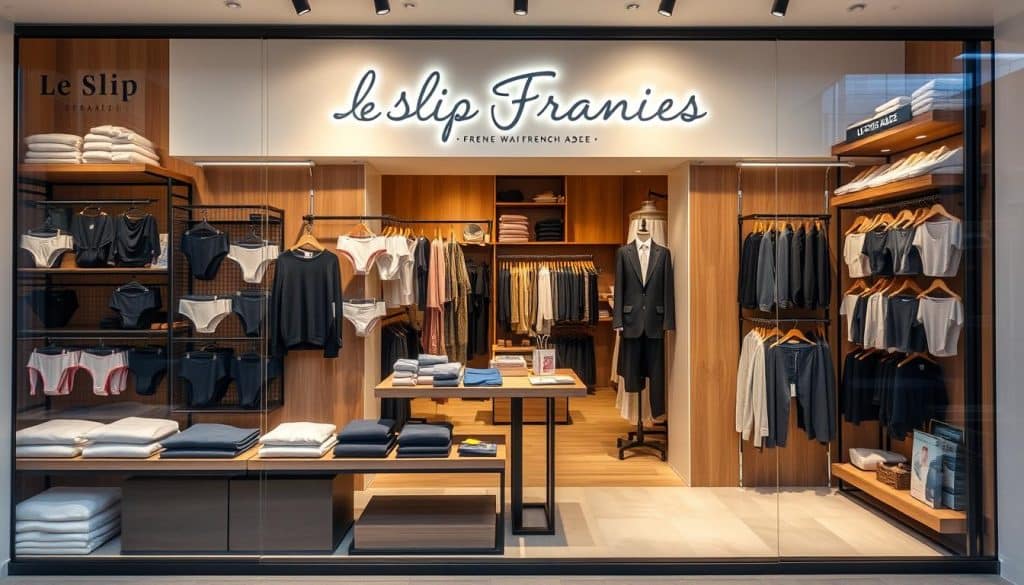
Business Model: Le Slip Français built a successful underwear and clothing brand based on 100% French manufacturing, combining patriotism with quality and humor in their marketing.
Key Success Factors:
- Strong “Made in France” positioning that resonates with consumers
- Transparent supply chain and manufacturing process
- Effective use of digital marketing and social media
- Distinctive brand voice combining humor with quality messaging
- Community building around shared values of local production
Growth Strategy: Founded in 2011, Le Slip Français started as an online-only brand before expanding to physical retail. The company raised €3 million in crowdfunding from 1,400 investors and now generates over €20 million in annual revenue, with 90% of sales in France and growing international presence.
Lessons for Entrepreneurs: Le Slip Français demonstrates how French manufacturing can be successfully positioned as a premium value proposition. By combining patriotism with quality and modern marketing approaches, the company created a distinctive brand in a competitive market, proving that local production can be economically viable with the right positioning.
Learn From Success Stories
Get our detailed analysis of 10 successful business case studies from Italy and France, with actionable insights you can apply to your venture.
Conclusion: Choosing Between Italy and France
Both Italy and France offer compelling environments for entrepreneurs, each with distinct advantages that may better suit different business models and personal preferences.
Italy: Ideal for Niche and Artisanal Ventures
Italy provides fertile ground for businesses that leverage the country’s strengths in craftsmanship, cultural heritage, and regional specialties. The Italian market particularly favors:
- Artisanal production with emphasis on quality and tradition
- Businesses that can leverage the “Made in Italy” premium globally
- Tourism and experience-based ventures in unique locations
- Food and beverage businesses with authentic regional connections
- Smaller enterprises with flexible, relationship-based operations
While navigating Italian bureaucracy requires patience, the country offers lower labor costs than France and a business culture that values personal relationships and flexibility. For entrepreneurs seeking to create distinctive, quality-focused businesses with strong cultural roots, Italy offers compelling advantages.
France: Suited for Scalable and Innovative Models
France provides a more structured environment with stronger institutional support for growth-oriented ventures. The French ecosystem particularly favors:
- Technology startups with scalable business models
- Innovative businesses leveraging R&D and intellectual property
- Companies seeking institutional investment and structured growth
- Businesses targeting the broader European market
- Ventures requiring highly skilled technical talent
France’s more formalized business environment comes with higher labor costs but also offers more comprehensive support systems for entrepreneurs, particularly in innovative sectors. For founders seeking to build scalable businesses with institutional backing, France’s ecosystem provides significant advantages.
Ultimately, the choice between Italy and France should align with both your business concept and personal preferences. Consider not only market opportunities and regulatory environments but also lifestyle factors, language capabilities, and cultural affinity. Many successful entrepreneurs find that their personal connection to a country’s culture and way of life becomes a significant factor in their business journey.
Whichever country you choose, thorough research, local partnerships, and cultural adaptation will be key to navigating the unique business landscape and building a successful venture in these dynamic European markets.
Ready to Start Your European Business Journey?
Our team of experts can help you evaluate which country is right for your specific business idea and guide you through the establishment process.

